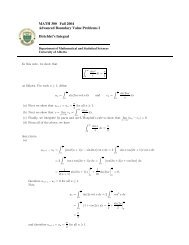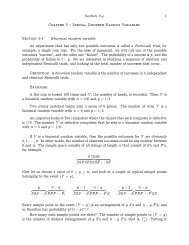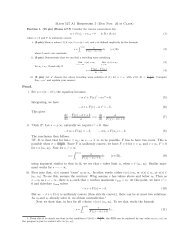Math 411: Honours Complex Variables - University of Alberta
Math 411: Honours Complex Variables - University of Alberta
Math 411: Honours Complex Variables - University of Alberta
You also want an ePaper? Increase the reach of your titles
YUMPU automatically turns print PDFs into web optimized ePapers that Google loves.
38 CHAPTER 5. CAUCHY’S INTEGRAL THEOREM AND FORMULA<br />
Theorem 5.4 (Higher Derivatives). Let D ⊂ C be open, let z0 ∈ D and r > 0 be<br />
such that Br[z0] ⊂ D, and let f: D → C be continuous such that<br />
f(z) = 1<br />
�<br />
f(ζ)<br />
2πi ζ −z dζ<br />
∂Br(z0)<br />
holds for all z ∈ Br(z0). Then f is infinitely <strong>of</strong>ten complex differentiable on Br(z0)<br />
and satisfies<br />
f (n) (z) = n!<br />
�<br />
f(ζ)<br />
dζ<br />
2πi ∂Br(z0) (ζ −z) n+1<br />
(∗)<br />
holds for all z ∈ Br(z0) and n ∈ N0.<br />
Pro<strong>of</strong>. We prove by induction on n ∈ N0: f is n-times complex differentiable and (∗)<br />
holds.<br />
For n = 0, the claim is clear, so suppose that it is true for some n ∈ N0. Define<br />
F : [0,2π]×Br(z0) → C, (θ,z) ↦→ n!<br />
2π<br />
f(z0 +re iθ )re iθ<br />
(z0 +re iθ −z) n+1.<br />
Then F is continuous and, by the induction hypothesis, satisfies<br />
f (n) (z) = n!<br />
� � 2π<br />
f(ζ)<br />
dζ = F(θ,z)dθ<br />
2πi ∂Br(z0) (ζ −z) n+1<br />
0<br />
for all z ∈ Br(z0). Furthermore,<br />
∂F<br />
∂z<br />
0<br />
(θ,z) = (n+1)!<br />
2π<br />
f(z0 +re iθ )re iθ<br />
(z0 +re iθ −z) n+2<br />
is continuous on [0,2π] × Br(z0). From Lemma 5.4, we thus conclude that f (n) is<br />
holomorphic on D with<br />
f (n+1) � 2π<br />
�<br />
∂F (n+1)! f(ζ)<br />
(z) = (θ,z)dθ = dζ.<br />
∂z 2πi ∂Br(z0) (ζ −z) n+2<br />
Corollary 5.4.1 (Generalized Cauchy Integral Formula). Let D ⊂ C be open, and<br />
let f: D → C be holomorphic. Then f is infinitely <strong>of</strong>ten complex differentiable on D.<br />
Moreover, for any z0 ∈ D and r > 0 such that Br[z0] ⊂ D, the generalized Cauchy<br />
integral formula<br />
holds for all z ∈ Br(z0) and n ∈ N0.<br />
f (n) (z) = n!<br />
�<br />
f(ζ)<br />
dζ<br />
2πi ∂Br(z0) (ζ −z) n+1







